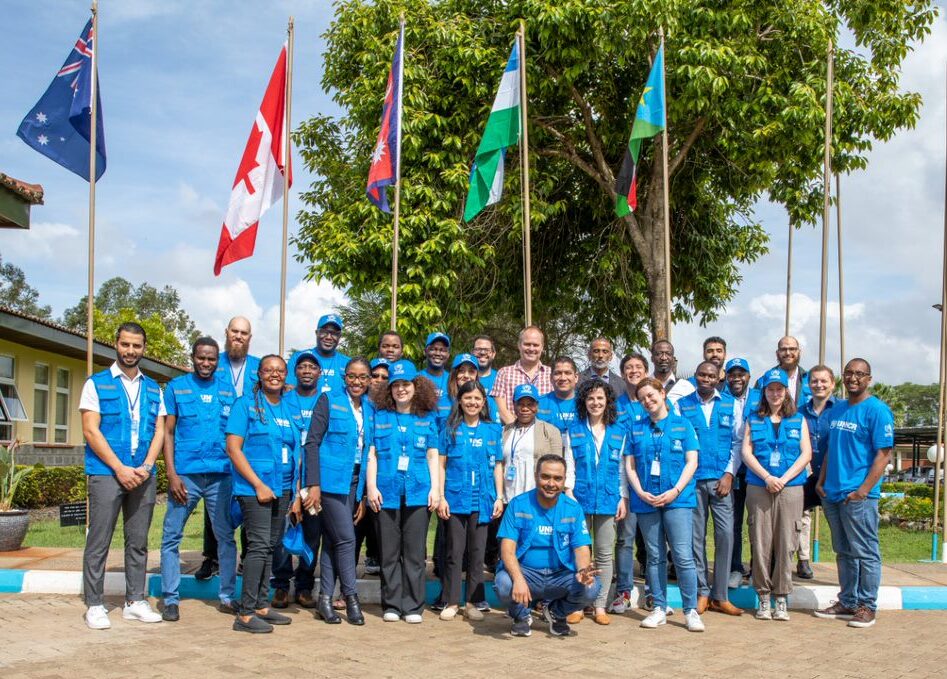
The UN Refugee Agency’s revamped Emergency Registration Learning Programme positions 20 additional staff from across the world for quick, efficient deployment to support registration needs. ©UNHCR/Charity Nzomo
Leri Joel Amos has always been passionate about serving displaced people, having been a refugee himself and spending most of his childhood and early adult life in Uganda, East Africa. Now a married father of four, the South Sudanese humanitarian works for UNHCR, the UN Refugee Agency, as an Assistant Registration Officer, in Bunj, South Sudan. His work often keeps him away from his family as the field office is far from his family home in Juba, the capital city. He is, however, used to this work – after all, the majority of UNHCR personnel are in field offices, often in emergency contexts where people are forced to flee conflict and natural disasters.
Quick Deployments to Support Registration in Emergencies
The typical emergency response relies heavily on UNHCR’s ability to quickly scale up on staffing, budgets, and activities that deliver assistance and protection. An emergency response often requires setting up registration activities to manage and coordinate the delivery of assistance and to provide documentation and protection.
UNHCR works with a roster of registration colleagues, who can be deployed within 72 hours when a new emergency arises. As emergency registration requires a specific set of skills, colleagues need to successfully complete a training programme before joining the roster.
To meet these needs of registration in emergencies, UNHCR’s Digital Identity and Registration Section (DIRS) developed the Training on Emergency Registration (TER) in 2015. During its seven years, more than 140 staff were trained and over 120 colleagues deployed to support registration in emergencies around the world. However, the humanitarian context is ever changing and so it was time to develop and update the training programme.
“We conducted a curriculum review of the TER in 2020 to improve how we build staff capacity to manage, coordinate, and respond to emergency registration needs now and in the future. This resulted in a newly designed Emergency Registration Learning Program,” explains Andrew Hopkins, Chief of the Digital Identity and Registration Section.
The new Emergency Registration Learning Programme (ERLP) consists of three stages: a self-administered e-learning course, followed by an online workshop, and finally an in-person workshop.
“The goal is to provide field-relevant training to build emergency registration competencies of staff. After this, they can be deployed to provide urgent, consistent, and quality emergency registration support through the emergency roster,” adds Christian Oxenboll, Senior Registration and Identity Management Officer. In addition, “The ERLP’s design to combine and maximize the advantages of online training and in-person workshop is highly effective.”
What do participants say?
Leri was among a group of 20 staff from different functional backgrounds and regions who started the program this February. He was motivated to apply for the ERLP to “enhance my knowledge and skills in emergency registration.”
Ari Habeeb Ahmed, an Assistant Registration Officer based in Duhok, Iraq, also took the course. For him, easing the tragic and harsh consequences that displacement brings to refugees is what motivated him to be a humanitarian.
“The ERLP is a well thought out and well-designed programme tailored to provide multi-discipline knowledge, skills building, and essential preparedness for Emergency Registration Officers,” he said. “I find that the different phases and courses offer real-life best practices, experiences from senior officers, scenarios, and case studies that are very insightful.”
His colleague Maureen Ikindu, based in Kasulu, Tanzania, agrees. As an Associate Resettlement and Complementary Pathways Officer, Maureen is sensitive to the plight of women and children in distress.
“I joined the emergency programme to be part of the team of first responders, with women and children in mind. The look of hope on the faces of the people we serve when they receive assistance gives me the zeal to continue helping,” she explains.
The 20 successful applicants have joined UNHCR’s emergency registration roster and are available to be deployed to support various operations across the world. The training will be scaled up to ensure more personnel like Leri, Ari and Maureen have an opportunity to benefit from and serve forcibly displaced people.
